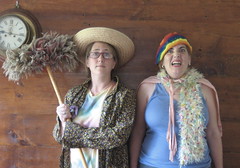All I can say is that it’s about time some students got upset about TurnItIn (no link love from me). I expected that it would be a university student somewhere that realized what they were doing, but nope…it was high school kids.
The for-profit service known as Turnitin checks student work against a database of more than 22 million papers written by students around the world, as well as online sources and electronic archives of journals. School administrators said the service, which they will start using next week, is meant to deter plagiarism at a time when the Internet makes it easy to copy someone else’s words.
But some McLean High students are rebelling. Members of the new Committee for Students’ Rights said they do not cheat or condone cheating. But they object to Turnitin’s automatically adding their essays to the massive database, calling it an infringement of intellectual property rights. And they contend that the school’s action will tar students at one of Fairfax County’s academic powerhouses.
Indeed. I asked TurnItIn representatives years ago at an ALA Midwinter conference how long they thought they could maintain their business model without compensating students for increasing their databases…no suprisingly, they didn’t really respond to my question.
I have long thought that they were getting away with something in the IP arena. Yes, I’m sure they’ve covered their legal bases with click-through licenses and such, but everyone knows those are only good until challenged. I see a class action suit on the way…students who’s work was used to produce profits for TurnItIn should see some of that profit, I think.
I actually spoke up here at UTC during my last faculty plagiarism workshop against TiI. Several of the faculty knew of it, but didn’t understand how it worked or what you got from it…although there were a couple of strident defenders of it in the room, I got across my rather strong feelings on the subject. It’s just wrong, even apart from the IP issues, in the same way that strip searches at the airport are wrong…trading liberties for an illusion of security (or in the case of TurnItIn, trading trust and honestly for guilty until proven innocent) is not the sort of image that our institutes of higher education should be dealing in.




